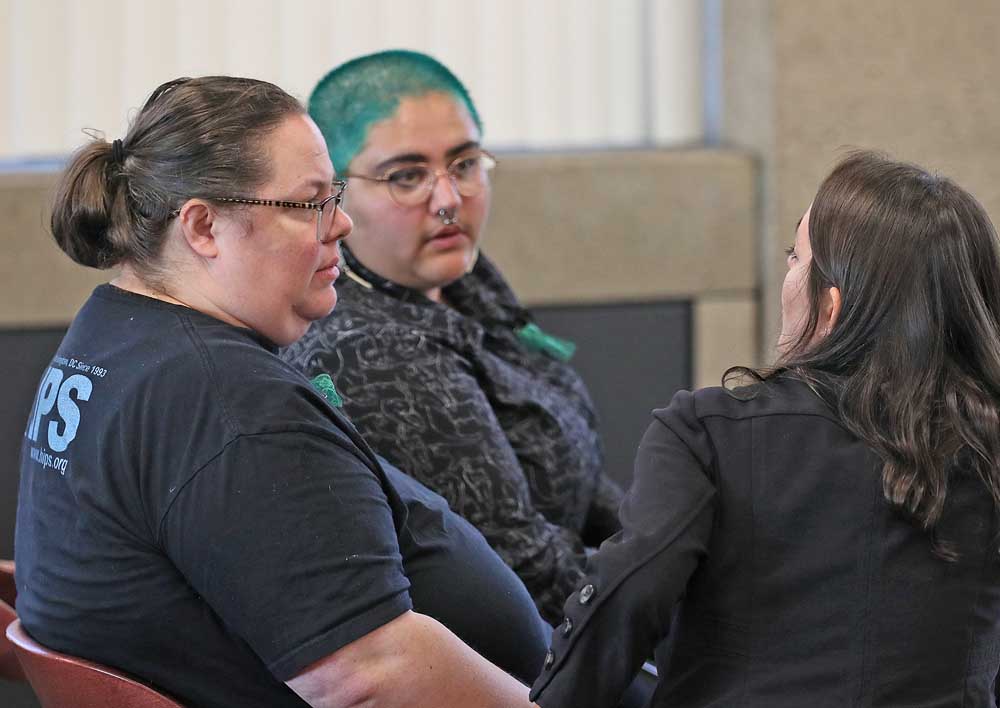Attorney for Stabbin Wagon puts Medford on notice of potential lawsuit
Published 1:45 pm Friday, October 6, 2023

- Stabbin Wagon employees Melissa Jones, left, and Samantha Strong talk with attorney Sarah Alvarez at a hearing Aug. 24 challenging the city's ban on them being in downtown Medford. A judge upheld the exclusion order.
A lawyer representing Stabbin Wagon, a harm-reduction nonprofit, has notified Medford city officials that they must preserve evidence in anticipation of a potential lawsuit.
Last month, Alicia LeDuc Montgomery, a lawyer based in Washington state, sent legal notices addressed to Medford City Attorney Eric Mitton. She informed him that her firm, LeDuc Montgomery LLC, is investigating the city’s records that touch on Stabbin Wagon and the nonprofit’s push to open a peer respite center with a hefty state grant.
LeDuc’s notices, obtained through a public records request, tell City Manager Brian Sjothun, police Chief Justin Ivens, Deputy Chief Trevor Arnold, Lt. Geoff Kirkpatrick, Mayor Randy Sparacino, Medford City Council, and the city and police department at large that they must “take reasonable steps to preserve and retain all hard copies and electronically stored information.”
The notices, dated Sept. 12 and 13, do not say what a lawsuit would allege.
In a follow-up email to the city attorney, Montgomery said the evidence preservation notices cover “all evidence, including but not limited to documents and communications” from Jan. 1, 2020, onward about the nonprofit; its director and founder, Melissa Jones, and an employee, Samantha Strong.
Montgomery told Mitton in the email that she would “send a tort claim notice separately.”
A suit has not yet been filed, Mitton told the Rogue Valley Times.
Montgomery could not be reached for comment.
Stabbin Wagon recently signed a contract with the Oregon Health Authority to receive $1.5 million to establish a peer-run respite program in Jackson County named Mountain Beaver Respite. The low-barrier program is designed for any adult in the throes of mental or emotional distress. Staffed by trained “peers” who have faced similar challenges and know the treatment landscape, the center will serve six or fewer people in a home for up to two weeks, according to the grant proposal.
The funds are available through HB 2980, a 2021 state law that allocated $6 million to fund four respite centers, each in a different part of the state, for two years.
The Health Authority disqualified six of the 11 grant applicants as nonresponsive, a spokesperson said. Of the five applications evaluated, Stabbin Wagon scored highest, according to documents. The Health Authority ultimately chose to fund three, though one has since had its grant suspended amid a state Department of Justice investigation, The Lund Report reported in August.
Stabbin Wagon is named for the free sterile injection needles the staff hand out, along with other supplies for safer drug use and overdose prevention, from their white van. The nonprofit, which incorporated in 2021, regularly operates at several sites, including Hawthorne Park.
Stabbin Wagon has a fraught history with law enforcement and local leaders.
Jones, who advocates for the unsheltered and drug-addicted population, has condemned Medford’s policies toward homelessness, including the city’s limitations on tent use and its sweeps of encampments. Both she and her employees espouse hard-left views. They have taken a divisive political tone and become confrontational with police and civilians. On social media, they have ridiculed critics and opponents by name. Posts savage officers as pigs and clowns.
In September 2020, Jones was among the individuals arrested for trespassing when the city closed Hawthorne Park and the police evicted its occupants. The park had become the site of a sprawling encampment after the Almeda Fire earlier that month.
More recently, Jones and Strong were arrested in August at Vogel Plaza during a Stabbin Wagon-sponsored “HIV Testing Party” when they allegedly tried to stop officers from taking a runaway juvenile into protective custody, the RV Times reported. Jones and Strong, who both pleaded not guilty in Medford Municipal Court, have been banned from part of downtown through Nov. 11.
When word of Stabbin Wagon’s grant got out in March, city officials, local police departments and addiction-treatment providers were incredulous, according to city emails obtained by a third party.
Chief Ivens: “Unbelievable.”
Lt. Kirkpatrick: “I have no words.”
Deputy Chief Arnold: “I’m speechless. Absolutely speechless.”
Sommer Wolcott, executive director of the treatment provider OnTrack Rogue Valley: “OHA did get an earful … This could blow up into an interesting media sh*t show. If anything, giving her 1.5 million might help blow things up faster.”
Wolcott clarified in an interview that she wasn’t saying anything good or bad about Stabbin Wagon in that email.
“Stabbin Wagon is controversial, and that’s what I was speaking to — that there’s a lot of opinions on both sides, and that it was going to result in a lot of people speaking up one way or the other,” she said.
By “blow things up faster,” Wolcott said she meant the larger debate regarding Health Authority funding. This includes the funds allocated through voter-approved Measure 110, which decriminalized possession of user amounts of street drugs and routed millions in cannabis tax revenue to treatment and support for people with substance use disorder. Last year, Stabbin Wagon received more than $582,000 in Measure 110 funds for harm-reduction work.
“There’s been so much drama around all of this that (Stabbin Wagon’s peer respite grant) would really pull things out and expose it,” she said.
In the emails, Sjothun called the grant “a disaster waiting to happen” and asked the city’s lobbyist, Cindy Robert, owner of Rainmakers Government Strategies, to contact the Heath Authority. Robert told Sjothun, “I do not know how you go about undoing.”
Chief Ivens and Lt. Kirkpatrick also reached out to the Health Authority to express their concerns, the emails show.
It is unclear from the emails, which cut off in early April, where the discussions went and whether the city’s outreach altered the grant process.
Montgomery has said in interviews that the city’s actions could be interpreted as interfering in a contractual relationship and as retaliation against a political rival.
In one email to an OHA employee, Ivens said that he wanted “to find out information about the grant, what the application process was, and what the oversight of the grant funding looks like moving forward.”
Sjothun said in a prior statement to the RV Times that the city has been seeking additional information on Stabbin Wagon’s proposed respite program and, given the nonprofit’s lack of experience with such projects, how it plans to serve its clients. He said, “Our outreach to the OHA has yielded no response to our request for information, either directly from our staff or through our lobbyist.”
Mitton said in an email about the city’s actions: “It is not clear to the City what would be improper about City staff expressing opinions about a State grant award or asking State officials questions about that State grant award.
“It is routine and appropriate for inquiries to be made to public entities like the State of Oregon about how that public entity is allocating its resources, just as the City of Medford routinely receives inquiries and opinions from citizens and entities about the City’s grant allocations and other expenditures,” Mitton wrote.
Tim Heider, a Health Authority spokesman, said in a statement about the status of Stabbin Wagon’s contract: “OHA is currently in the process of revising the peer respite grant agreement template to ensure there are clear deliverables and oversight, and will provide that grant agreement to Stabbin Wagon for review and signature. Once the grant agreement is fully executed we will work closely with Stabbin Wagon to support and monitor implementation goals.
“Please note that this grantee will be subject to regular oversight to ensure they are meeting terms and conditions of their grant agreement, including project deliverables.”






